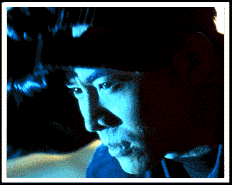

















 |
|
|
My name
is Joe
|
|
by
Dylan Gray
|
 |
It’s
hard to say why it is that Ken Loach’s films are always assigned to the
‘art movie’ category, beyond the fact that the man’s arsenal of filmmaking
tools puts that of virtually anyone else I can think of to shame, and is
all the more shatteringly powerful for being devoid of gimmickry.
Loach’s movies strike one as being simplicity itself, deceptively raw and
unpolished. The characters are generally blemished, physically unattractive,
run-of-the-mill, at best. The basis for every creative decision appears
to be street credibility, no false notes. Tragedy afflicts small
people, we can see it coming, there’s no orchestral music, no slow-motion
deaths with quotable last utterances. They made mistakes, got tangled
up in the spokes of banal hopelessness, are doomed to pay the price and
we know it happens a million times over every minute. The fact that
it rings so startlingly true, that Loach’s human beings are invariably
both jovial and melancholy, caring and irresponsible, capable and helpless,
reminds one of relatives and neighbours we all have... and what the hell
are they doing in the movies? The fact that watching these people
on the big screen should come as the shock it clearly does to those who
see My Name is Joe is a devastating commentary about the cinema’s lack
of relevance to and resonance in people’s daily lives, a stark illustration
of just what crap 99% of the films we are ‘given the opportunity’ to behold
for 300-550 forints truly are, and how rare and precious what Ken Loach
has given us is. Peter Mullan is brilliant as a recovering alcoholic
who serves as father figure to a losing football squad comprised of luckless,
young, working-class men. The Scottish neighbourhood in which they
all live (presumably in Glasgow, though it’s never named) is typified that
ever-so-British cocktail of chronic unemployment, drugs and thugs, which
Loach returns to time and again in his movies, and which will be instantly
recognizable to those who have seen such films as Raining Stones and Ladybird,
Ladybird. Though Mullan’s Joe is himself unemployed and living a
hand-to-mouth existence, he manages to exude a workaday optimism and humour,
having made an escape from the chemical dependency which had turned him
into a veritable zombie, breaking free in the aftermath of a violent incident
ten months before we meet him. Fully aware that his luck in having
been able to do so was great and rare, Joe attempts, in his own small way,
to help a few young men in his community avoid fates similar to or worse
than that which he had endured.

|
|
This he
does both by organizing the football team and helping them organize their
daily lives. His main project is Liam, a newly clean junkie with
a still-addicted wife, a four-year-old son, and a major debt to the local
maffiosi, dating from his dealing days. Also working with Liam’s
family is Sarah (Louise Goodall), a government social worker, with whom
Joe crosses paths. The relationship between Joe and Sarah, who between
them have ‘hundreds of children,’ but whose social lives are wastelands,
begins tentatively before developing into an all-consuming love affair.
The contrast between Joe and Sarah’s approaches to the social ills in evidence
all around them is basic and profound, and strongly mirrors their respective
class backgrounds and histories. Joe, by all indications, has grown
up in the neighbourhood, been left as a failure by the system, struggled
through years of addiction, before a traumatic event jarred him into dragging
himself out of it. He takes a do-it-yourself attitude to helping
a few he thinks he might save from the hell he himself knew, and from inevitable
early death. Sarah, on the other hand, represents the paternalistic
hand of the state, the system which never failed her in her middle-class
life, and which she believes holds the promise of salvation to all with
the genuine desire to be saved. The violent clash between these viewpoints
provides the climax of the film, as Joe takes it upon himself to settle
Liam’s debts with McGowan, the local don, despite having to risk his life
and do the wrong thing in order to settle the score. The fact that
he does all this to write off a debt of a few thousand pounds, a sum which
any middle-class Briton would be able to raise with little fuss, underscores
the gaping gulf between Joe and Sarah’s worlds. Loach’s social realism,
unlike the feel-good, everything’s-gonna-be-alright variety pervading recent
popular British films touching on the plight of the working class, such
as Brassed Off! and The Full Monty, does not allow for pat happy endings.
A flicker of hope, nonetheless, remains defiantly, unmistakably in evidence.
Loach’s left-socialist convictions, as ever, ring through, more refreshing
than they ever have been in this post-cold-war world of political oblivion
and social indifference. For all the shifts in geopolitics, Joe’s
neighbourhood hasn’t changed much, and certainly not for the better.
My Name is Joe is brilliant, certainly one of Ken Loach’s best films, one
of the most outstanding films of recent years, and rare cause to feel like
there might still be some point in taking an interest in the cinema these
days after all.
Dylan
Gray
|